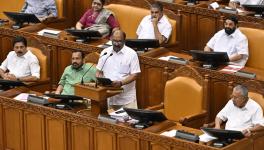Supreme Court Reserves Verdict on Sabarimala Review Petitions
After hearing as many as 65 petitions including 56 review petitions and four fresh petitions in the Sabarimala temple case, the Supreme Court on Wednesday reserved its verdict. The pleas were seeking a review of the apex court’s verdict on in September 2018, allowing women from all ages to enter the temple.
A five-judge constitution bench headed by Chief Justice of India Rajan Gogoi was hearing the petitions.
Opposing the review petitions, Kerala government reiterated its stand, and made it clear that the order should not be reviewed. Along with the Kerala government, Travancore Devaswom Board (TDB) and the two women who have entered the temple – Kanaka Durga and Bindu – too have opposed the review petitions.
The Travancore Devaswom board which had earlier opposed entry of women from menstrual age, took a U-turn, saying that they would respect the Supreme Court verdict. Rakesh Dwivedi, who has appeared for the Travancore Devaswom Board termed the board’s stand as a conscious decision to support and respect the court judgment.
“Everyone is entitled to enter the temple. Any practice has to be dominant with the view of equality. We have taken a decision to respect the judgment,” the court was informed.
Read More: Violence Follows Women’s Entry in Sabarimala in Kerala
Indira Jaising, who appeared Kanaka Durga and Bindu, said that all the Gods accept all human beings. “If a woman is a person in the eyes of the law, she has the right to go if her conscience allows so,” she said.
Review petitioners including Nair Service Society (NSS) and Tantri family of the Sabarimala Temple have placed their arguments before the court, and sought reconsideration of the September 2018 verdict.
The former attorney general and senior advocate K Parasaran, who appeared for NSS, lashed out at the majority verdict saying that Article 15 of the Constitution “throws open all public institutions of secular character for all classes of citizens but the article conspicuously omits religious institutions”.
Seeking reconsideration of the verdict, Parasaran argued that the article dealing with the abolition of untouchability in society was wrongly used by the Supreme Court in its judgment regarding exclusion of women of menstrual age. He even argued that the court should consider the celibacy of the deity.
Read More: In My Own Voice: Menstruation & Livelihood
Countering all these arguments, senior Advocate Jaideep Gupta who is appearing for the Left Democratic Front government in Kerala, argued: "Nothing has been placed before Your Lordships that would justify a review. If a substantial case were to be made, we will make exhaustive arguments."
The government’s take was that disruptions in social peace cannot be a ground to let a constitutional wrong persist.
"The overriding thing is that there was a consensus of Your Lordships (in the majority judgment) on three issues. Firstly, under Article 26, it is not a denominational temple. The devotees of Lord Ayyappa are not a denomination but a general body of Hindus. Anybody can go and visit the Temple. Secondly, excluding a person till the age of 50 is an exclusion for a major portion of the life of the person. Finally, Rule 3(b) [of the Kerala Hindu Places of Worship (Authorisation of Entry) Rules] is violative of section 4 of the 1965 Act itself, besides article 25(2)(b)," argued Gupta.
Read More: Liberalism and Sabarimala: Why Shashi Tharoor is Wrong
He added that the exclusion of women from temples is not essential to the Hindu religion and women are allowed in many other Ayyappa temples.
"A challenge on the ground that Articles 15 or 17 were not considered will not have an effect on the judgment so far as these three go. The mandamus will remain. Unless it is proved that a consideration of the same would affect the three points of consensus, there should be no review", Gupta countered the arguments of the review petitioners.
With inputs from LiveLaw.in.
Get the latest reports & analysis with people's perspective on Protests, movements & deep analytical videos, discussions of the current affairs in your Telegram app. Subscribe to NewsClick's Telegram channel & get Real-Time updates on stories, as they get published on our website.
























